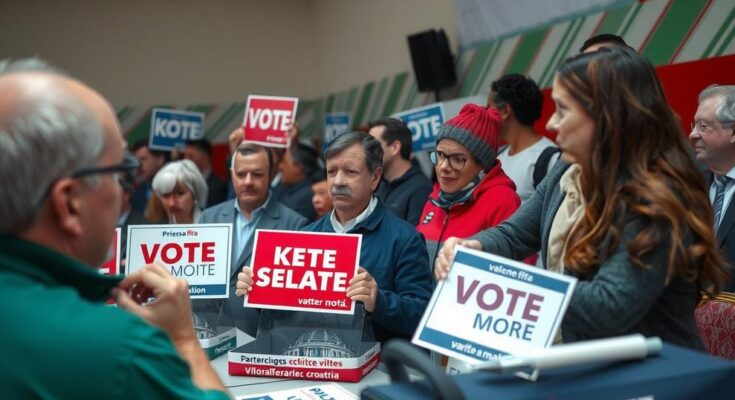Croatia’s presidential election on December 29, 2024, features incumbent Zoran Milanović and Dragan Primorac of the HDZ. Milanović, a critic of NATO and EU support for Ukraine, anticipates a runoff. The election reflects diverging views on Croatia’s international alignment, amidst a backdrop of recent electoral activity. Corruption and economic issues are also crucial factors in the vote.
On December 29, 2024, Croatia conducted its presidential elections wherein President Zoran Milanović, a notable critic of Western military support for Ukraine, faced off against Dragan Primorac, the candidate from the ruling Croatian Democratic Union (HDZ). Milanović, characterized by a populist rhetoric and a less conventional political style reminiscent of Donald Trump, predicts that he may not secure an outright victory, anticipating a second round if he fails to garner more than 50% of the vote. The election has become a pivotal contest, showcasing stark ideological differences between candidates regarding Croatia’s international orientation, particularly concerning NATO and EU affiliations.
Milanović’s governance has been defined by stark opposition to Prime Minister Andrej Plenković, particularly with Milanović’s assertion that Croatia should remain neutral amidst global conflict. In contrast, Primorac pursues a more decidedly pro-Western stance in contrast to Milanović’s perceived pro-Russian inclinations, thus framing the election as crucial to determining the future trajectory of Croatia’s foreign policy. Meanwhile, Marija Selak Raspudić, an independent candidate trailing in third place, has focused her campaign on domestic economic issues and corruption, capitalizing on the public dissatisfaction with the ruling elite. The favorable poll results for Milanović position him as a formidable candidate, yet the outcome remains uncertain, potentially leading to a runoff on January 12, 2025, if necessary.
Amidst a backdrop of recent electoral fatigue—with the presidential election being the third in a year following parliamentary and European elections—this contest reflects broader debates about governance, international relationships, and national identity within Croatian society. The results of this election, regardless of single-round outcomes, will undoubtedly shape the political landscape moving forward, influencing Croatia’s strategic foreign policy and internal governance practices accordingly.
Croatia is currently experiencing a significant political moment, epitomized by the presidential election featuring incumbent Zoran Milanović, a selective critic of NATO and EU policies, particularly regarding their involvement in Ukraine. The backdrop to this election includes a polarized political environment where Milanović’s previous tenure as Prime Minister and his current role highlight a shift in democratic dialogues surrounding national defense and international alliances. His primary rival, Dragan Primorac, represents a contrasting vision advocating for a pro-Western approach. The political climate emphasizes important questions regarding the state’s orientation in the face of rising tensions with Russia and internal challenges, such as corruption and economic disparity.
The presidential elections in Croatia present a crucial moment for the nation’s political landscape, as incumbent Zoran Milanović prepares to potentially battle for reelection against Dragan Primorac amid stark ideological divides. With Milanović’s notable criticisms of NATO and EU positions and Primorac’s advocacy for a pro-Western agenda, the election underscores profound concerns regarding Croatia’s future direction. The electoral outcome, which may lead to a runoff, will notably influence not only Croatia’s domestic reality but also its international relations. Moreover, the broader implications resonate within the context of rising geopolitical tensions and internal governance challenges that demand effective leadership and strategic democratic dialogues.
Original Source: apnews.com




